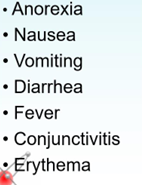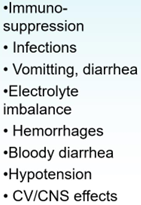Total Body Irradiation
1/81
There's no tags or description
Looks like no tags are added yet.
Name | Mastery | Learn | Test | Matching | Spaced | Call with Kai |
|---|
No analytics yet
Send a link to your students to track their progress
82 Terms
Death
of course, is the most devastating human response to radiation exposure.
late effects of x-ray exposure
No cases of death after diagnostic x-ray exposure have ever been recorded, although some early x-ray pioneers died from the
total radiation dose
In each of these cases, however, the ____ was extremely high by today’s standards
Diagnostic x-ray beams
are neither intense nor large enough to cause death
ACUTE RADIATION SYNDROME
The sequence of events that follow high-level radiation exposure leading to death within days or weeks is called
Acute radiation-induced lethality
is of only academic interest in diagnostic radiology
diagnostic radiology
Acute radiation-induced lethality is of only academic interest in __
Acute Radiation Syndrome
Most notable deterministic health effect of ionizing exposure
deterministic
Acute Radiation Syndrome is a most notable ____ health effect of ionizing exposure.
Acute Radiation Syndrome
Sign and symptoms are not specific for radiation injury but collectively high characteristic for
inflammation
The main clinical sign
hypoplasia
The main structural feature
Acute Radiation Syndrome
Combination of symptoms occurring hours to week after exposure
Acute Radiation Syndrome
Combination of symptoms occurring hours to week after exposure
3
There are, in fact, ____ separate syndromes that are dose related and that follow a rather distinct course of clinical response
1. Hematologic death
2. Gastrointestinal (GI) death
3. Central nervous system (CNS) death
There are, in fact, 3 separate syndromes that are dose related and that follow a rather distinct course of clinical response, such as the:
Syndrome
It is the collection of signs and symptoms characterizing the response of an organism to radiation stimulus
Mean survival time
It is the average time between exposure and death.
LD 50/30
It is the lethal dose required to kill 50% of a population in 30 days
LD 50/60
It is the lethal dose required to kill 50% of a population in 60 days
250–300 rads
The LD50/60 in human is approximately
1. Prodromal Stage
2. Latent Stage
3. Manifest Illness Stage
4. Recovery or Death
In addition, to the three lethal syndromes, there are stages of response based on radiation dose level, such as the: (4)
Prodromal Stage
At radiation doses above 100 rad (1 Gy) delivered to the total body
Nausea
Vomiting
Diarrhea (N-V-D)
Leukopenia
The symptoms of early radiation sickness often take in the form of:
Prodromal Stage
may last from few hours to a couple of days.
Prodromal Stage
The severity of symptoms is dose related.
Prodromal Stage
At doses in excess of 1000 rad (10 Gy), symptoms can be violent.
dose related
The severity of Prodromal Stage symptoms is ____.
1000 rad (10 Gy)
Prodromal Stage At doses in excess of ____, symptoms can be violent.
still higher doses
At ____, the duration of prodromal syndrome becomes shorter, until it is difficult to separate from the period of manifest illness.
shorter
At still higher doses, the duration of prodromal syndrome becomes ___, until it is difficult to separate from the period of manifest illness.
manifest illness
At still higher doses, the duration of prodromal syndrome becomes shorter, until it is difficult to separate from the period of _____.
Latent Stage/Period
After the period of initial radiation sickness, a period of apparent well being occurs, which is called as the
Latent Stage
extends from hours or less(at doses in excess of 5000 rad) to weeks (at doses from 100 to 500 rad).
5000 rad
Latent Stage extends from hours or less(at doses in excess of ____ )
100 to 500 rad
Latent Stage extends from hours or less(at doses in excess of 5000 rad) to weeks (at doses from ____)
early recovery
moderate radiation dose
The latent period is sometimes mistakenly thought to indicate an ____ from a ____.
Latent Stage
The ____ is sometimes mistakenly thought to indicate an early recovery from a moderate radiation dose.
Manifest Illness Stage
After the latent stage, the animal becomes noticeably ill and shows signs and symptoms of the specific syndrome reflecting the organ system that is damaged
Manifest Illness Stage
It lasts from minutes to weeks depending on the dose
Death or Recovery
The animal either recovers or dies as a result of the damage sustained from the radiation exposure
Prodormal

Latent (Acute Radiation Syndrome)

Manifest Illness (Acute Radiation Syndrome)

Hematopoietic Syndrome
Also termed as hematologic, hematopoietic, or bone marrow syndrome
Hematopoietic Syndrome
Prodromal Stage
Nausea and Vomiting ✓ Bone marrow stems cells are dying ✓ Fewer mature cells being produced and lower numbers of cells in the circulating blood.
Hematopoietic Syndrome
Prodromal Stage
Hours after exposure
Hematopoietic Syndrome
Latent Stage
Few days to 3 weeks after exposure
Hematopoietic Syndrome
Manifest Illness
3-5 weeks post exposure
Hematopoietic Syndrome
Manifest Illness
Depression of all blood cell counts (cytopenia), which causes anemia and infections
Hematopoietic Syndrome
Recovery or Death
occurs between 100 and 1,000 R, with death occurring within 6-8 weeks in some individuals at a dose of 200 R
Recovery or Death (Hematopoietic Syndrome)
Death results from anemia and infection
Hematopoietic Syndrome
The LD50/60 for humans is estimated to be about 450 R or 250–300 rads, and is in the dose range of this syndrome
Gastrointestinal Syndrome
Appears in all animals at doses between 1,000 and 10,000 R.
600 R
Gastrointestinal Syndrome in humans, symptoms appear at a threshold dose of
1,000 R
Gastrointestinal Syndrome in humans, symptoms appear at a threshold dose of ith the full syndrome manifest at
Gastrointestinal Syndrome
In humans, symptoms appear at a threshold dose of 600 R, with the full syndrome manifest at 1,000 R
Gastrointestinal Syndrome
Occurs because of damage to the GI tract and bone marrow
Gastrointestinal Syndrome
he GI tract lining, especially the small intestine, is damaged by doses in this range
Gastrointestinal Syndrome
The mean survival time remains relatively constant, at 4 days
4 days
Gastrointestinal Syndrome mean survival time remains relatively constant, at
Central nervous system Syndrome
It occurs at doses greater than 5,000 R in humans
5,000 R
Central nervous system Syndrome occurs at doses greater than ____ in humans
CNS syndrome
Death caused by the ___ is not fully understood.
CNS damage
may result from damage to the blood vessels that supply the system,
• edema (swelling) in the cranial vault
• vasculitis (inflammation of blood vessels)
• meningitis (inflammation of the spinal cord and brain membranes)
CNS damage may result from damage to the blood vessels that supply the system, thus causing:
Gastrointestinal Syndrome
Prodromal Stage
Hours after exposure
involves nausea and vomiting, cramps, and diarrhea
Gastrointestinal Syndrome
Latent Stage
Occurs through the 15th day.
Gastrointestinal Syndrome
Manifest Illness
Perseveres from the 5th through the 10th days.
Gastrointestinal Syndrome
Manifest Illness
Perseveres from the 5th through the 10th days.
Gastrointestinal Syndrome
Recovery or Death
3 days to 2 weeks
Gastrointestinal Syndrome
Recovery or Death
Death results from infection, dehydration, and electrolyte imbalance
Central nervous system Syndrome
Prodromal Stage
Depending on the dose, lasts from a few minutes to a few hours
Central nervous system Syndrome
Prodromal Stage
✓ nervousness ✓ confusion ✓ nausea and vomiting ✓ loss of consciousness ✓ burning sensations of the skin
Central nervous system Syndrome
Latent Stage
-May last several hours
Central nervous system Syndrome
Manifest Illness
Occurs 5-6 hours after exposure
Central nervous system Syndrome
Manifest Illness
✓ Diarrhea ✓ Convulsions ✓ Coma ✓ Death
Central nervous system Syndrome
Recovery or Death
Within 2 days
Central nervous system Syndrome
he mean survival time is again dose dependent, varying from approximately 3 days to a matter of hours
3 days
Central nervous system Syndrome the mean survival time is again dose dependent, varying from approximately
organs
The sensitivity to radiation of different organs and their consequences for the individual person vary very much between
a. the fraction of the organ irradiated (the volume effect)
b. the overall exposure time (the time factor)
c. the dose rate or dose per fraction (the fractionation effect)
Influencing factors on radiation sensitivity depends on: